FP465 – The Long Tail
Welcome to Flash Pulp, episode four hundred and sixty-five.
Tonight we present The Long Tail
[audio:http://traffic.libsyn.com/skinner/FlashPulp465.mp3]Download MP3
This week’s episodes are brought to you by Chrononaut Cinema Reviews!
Flash Pulp is an experiment in broadcasting fresh pulp stories in the modern age – three to ten minutes of fiction brought to you Monday, Wednesday and Friday evenings.
Tonight we present a tale of pets and prey.
The Long Tail
Written by J.R.D. Skinner
Art and Narration by Opopanax
and Audio produced by Jessica May
Lewis had always lived his life as a man trapped by the tides. His father had provided him a body strong enough to keep himself afloat, but neither parent had been able to impart wisdom enough to make him head for shore.
Now, standing at the rear of the stripmall pet shop with Irena at his side, he had never felt so far out of his depths.
She wore her hair in a short black bob that hovered over her black suit jacket, which was in turn matched by a black skirt, and the outfit completed by a pair of knee-high black boots. The only spot of white in the arrangement was a patch of white collar at her throat, and yet the rise of her cheeks and the point of her jaw made her look immaculately precise, as opposed to a funeral mourner.
They had been seeing each other for the better part of the year, though it was only in the last six months that he’d begun to invest a little more in new jeans and shirts with buttons. He’d even largely ceased flirting with the bartender at O’Gobbler’s.
Despite the knot in his stomach, his mouth swung open and his spiel began rolling out.
Thrashing forward had been the only way he’d ever lived.
“Hey, babe, I was thinking – well, remember what I was joking about a couple of weeks ago?”
They’d been lying in his bed at the time, sweating into the darkness as they caught their breath. He’d said, “you should just move in, you know?”
Though he’d been there a dozen years, he’d never considered sharing the loft he rented with any visitor till just that moment, and the thought had escaped his lips before he’d fully turned it over.
He’d felt her smile, her neck on his arm, and she’d nuzzled his jaw, but the room had remained silent until both had drifted into sleep.
“What do you think of this one?” she posed instead of replying, an amber nail against the glass. The kitten she was pointing at was mostly paws, its white toes stark against the rest of its black coat.
“All kittens are cute, right?” answered Lewis, “That’s basically their job.”
Again her lips slid upward into a smile, yet her eyes seemed to hold questions.
“What were you saying?” she asked as she waved over the bored teen at the counter.
“Well, I was thinking – you know, maybe you really could move in? Or I could go to your place, I guess.”
The smile held, as did the lack of answers in her eyes, then the teen arrived and used a ring of keys to retrieve the ball of fur.
Having raised the issue was exposing enough, Lewis had no interest in pressing the point with the mop-headed stranger so close at hand.
She straightened. “Will you always take care of this cat?”
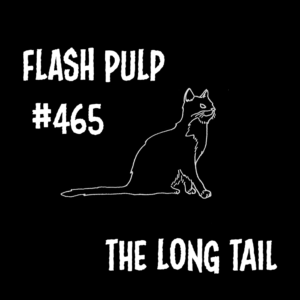 He tensed, wishing that she’d just, this once, give him a straight reply instead of edging about his words and leaving him to wonder where he was at. Rather than let frustration sink in, however, he held his tongue. The water was too deep to be drowning in his own mistakes – there was something in the question he knew, if only on an instinctual level, that was critical to the answer he would receive.
He tensed, wishing that she’d just, this once, give him a straight reply instead of edging about his words and leaving him to wonder where he was at. Rather than let frustration sink in, however, he held his tongue. The water was too deep to be drowning in his own mistakes – there was something in the question he knew, if only on an instinctual level, that was critical to the answer he would receive.
“Yeah, of course,” he answered.
Her head tilted briefly, then her smirk gave way to flawless teeth.
“Okay, I’ll pay and then we can get some boxes. We can figure out most of it this weekend, but there are a few things I’ll want from my old place before then.”
* * *
Two months later she was calling from a brown-furniture-on-a-brown-carpet-accented-by-brown-curtains hotel room in Pittsburgh. Work had her on the road quite often, but her regular distance did little to negate the sudden bouts of fierce intimacy that were the hallmarks of her affection.
He could hear her occasionally sipping at her tall glass of milk as she listened to his responses.
“Yep,” Lewis was saying, “all good here.”
In truth, however, he was struggling to come up with his half of the rent. While, in the three months of their cohabitation, she’d only climbed the ranks of the drapes distributor at which she worked, he had just been fired from his job wrangling a UPS truck. He’d told his mom his boss was a dick who’d been out to get him since his first day. He’d told his friends that he couldn’t be too mad about the whole thing, as he hated the job and he really had stolen the packages he was accused of scooping.
He told Irena nothing – at least not until he had a way to make up his missing funds.
“You know,” she said, her voice a hum tickling his ear even across the wires and airwaves,”If there was something you could tell me. I’m happy to help in any way I can.”
It was tempting to say yes, and he knew if it had been any of his previous relationships he absolutely would have – yet with Irena it was different. She was making more money than him, but it wasn’t just his notion of manhood that was rankled; there was something, too, in the way she so breezily departed for the airport, so easily rented a car to carry her out of town.
There was definitely fondness there – moments of intense closeness while talking on the couch, her head in his lap, and even a few bite marks along his neck from when things grew even closer – but these flashes of heat were only deepened by her comfort with distance.
He had never been so close to a woman like her, and he knew somehow – by her laughter during the boxing matches which he bet too heavily upon, by the fact that she was the only woman he’d ever met who shaved her legs with a straight razor, by her gentle teasing whenever he was struck by a cold – that to admit he needed her help was to lose her. Maybe not today, he knew she cared enough to carry him, but eventually and inevitably.
“Really, everything’s all good,” he replied.
“Okay, just be sure you’re looking after Canary.”
“Of course.”
She never said goodbye, their conversations were usually curtailed by her tone – affectionate but receding.
After the click, however, he recalled her reminder and shook out a meal for the cat.
* * *
His rent money came that month on the back of a guy who’d only introduced himself as Little Earl. There’d been nothing particularly interesting about the man’s size – if anything Lewis thought he should have been named Medium Earl – but so long as the cards kept pulling money from his pocket Lewis was happy to call him whatever he liked.
The back table at O’Gobbler’s had been a last ditch effort. Lewis had played some poker online, but he’d never gone so far as to bet with real money. He did not consider that this was only because credit card companies’ were reluctant to issue him any plastic. He resisted returning long enough to hand over Little Earl’s well-thumbed bills to Irena, and to confess his lack of of employment, but that next morning, after convincing himself he would finally get on with job hunting, he landed again at the bar rail.
With just under two hundred left of his victory fund, once his Coors was removed from the tally, it struck him that he’d feel a lot better about his job hunt if he could pad his egg some more.
There was no sign of Earl, in any shape or size, and only one of the four tables behind the Employees Only door was occupied. The two bearded men at its edges were exchanging lazy words and half-hearted card tosses. There was no money on the table.
At least, until Lewis arrived.
Less than two hours later – and that only because of Lewis’ breaks to retrieve a fresh beer and strategize uselessly while staring at the news unspooling on the TV over the bar – he was down to his last pair of twenties.
Despite the noon hour he spent the rest of his day cursing himself and wandering the city aimlessly. To his mind the only greater sin than having lost his cash would be to return before Irena so that she would think he’d wasted his day sitting around at home.
He was up early the next morning.
It seemed important that he leave well before she was due at work.
Hearing the slide of the hallway closet, and the squeaking of his shoes on the tile, however, Irena stepped out from the kitchen and caught him at the door. She was wearing only his off-gray sweater and a glitter in her eye.
With a raised brow, and a twitch of a smile at the edge of her lips, the woman asked, “where are you off to?”
“I’m on the job hunt.”
Her gaze raked his need of a haircut, his facial stubble, the ripped denim over his right knee, but her tone remained sweet and light. “In that shirt?”
As if he’d always intended to, Lewis extended a hand and lifted out his only suit jacket.
“Blazer over t-shirt is in these days,” he replied.
She leaned in close, as if she were about to deliver a kiss, and the tips of her bob brushed his cheeks – yet, despite his puckering, she instead gently bit the tip of his nose. Then she turned, moving down the hallway on swaying hips.
* * *
Six weeks later he was still wearing the jacket. He’d managed to play his forty into four hundred, and that was enough to convince Lewis the change of wardrobe had brought him luck.
His opinion did not shift when the four hundred drifted away in a run of bad hands, but it certainly got the credit when, a few days later, he managed to put himself over the thousand mark.
So life continued for six weeks. The waves only grew. The highs were huge, and there were moments when he had more money in his pocket than he’d ever held with a regular job. The troughs were equally as massive, however, and eventually he finally bottomed out.
Irena was already home when he arrived back at their shared apartment. She was curled up on the bed, one of her black and white movies unspooling on her laptop as she dipped a hand into her popcorn bowl with enthralled regularity.
“Hey, babe,” he’d said, pulling off the blazer, “I, uh, you know I hate to ask, but could I borrow maybe a hundred bucks til payday?”
She slapped the pause button, her features taut – yet there was still a hint of a smile upon her lips.
“Payday? You found a job?”
“Uh,” he replied, “yeah.”
There was a long silence in the room, then Canary jumped up onto the bed and mewled.
“Of course,” answered Irena, then, with a pat of the space beside her, she continued, “come watch this, it’s almost done.”
Though he’d intended the lie to somehow relieve pressure, in truth it only made him feel a need to work twice as hard at the tables.
By the time she left for a two-week training stint in Cleveland he barely noticed her departure. Panic had settled into his bones. The hundred had gone quickly, but he’d been lucky in finding a fellow – everyone simply called him Squint – who had, with some haggling, lent him a grand. Even after a couple of defeats this had allowed Lewis to cover another month’s worth of rent, but after that his losses had come hard and fast. He felt as if he was attempting to sprint up the down escalator.
He began to return home just long enough to sleep, and his departure was only slowed by Canary curling himself about his leg to ask for food.
Then the bag ran dry.
“Hopefully I’ll have some cash to spare tonight,” he’d told the cat, but that day was no more lucky than the last.
Irena called that night, and there was amusement in her voice as she mentioned that she’d been trying to reach him all evening.
“Sorry, this new job has me pretty busy. Training and stuff, you know.”
“Sure,” she replied.
“Do you mind if I use that twenty on the dresser?”
“Sure,” she replied again.
“Thanks babe.”
“How’s the cat?” she asked, but he was already gone.
* * *
The session went so well, Irena told him, that they requested she stay back to help the with following group of staff from her office, due the next Monday. She never presented it as a question – there was a purr of affection in her voice as they spoke, but there seemed to be little concern about the distance between them.
He, on the other hand, was consumed with his own troubles.
Squint had also had some recent bad luck, and he wanted his money back – every bite-sized loan, with interest. Five grand was a total beyond Lewis’ grasp at the best of times, and the rent clock was ticking.
The argument began outside O’Gobbler’s, but Lewis’ usual tactic – of simply walking away and ignoring the problem – did not work. Squint stayed at his elbow, his demands growing louder and more insistent.
Lewis had spent five minutes, that morning, searching for Irena’s straight razor before realizing she had packed it. He’d settled, after a hunt through the kitchen drawers, for the paring knife from the countertop block that had come with her move.
The alley had seemed a safe shortcut. It was midday and the sun was bright for the hundred steps or so – but he had not reckoned on the way the stone walls cut off all street noise, or how Squint’s breath had suddenly smelled so close.
His mind was jumbled as to which had pulled their blade first. He thought he’d reacted to Squint reaching into his jacket, but perhaps Squint had been suspicious of the motions which Lewis used to show his pockets were empty.
Well, almost empty. Squint took one broad swipe at his face, narrowly missing his neck, and Lewis reacted with an upwards thrust that was actually intended to bring his weapon into view.
He left the handle protruding from the moneylender’s belly as he sprinted from the brick canyon.
There was no time to feed the cat when he got home – no time for anything but to scribble a short note and toss the majority of his dresser drawer into a gym bag.
Riding the bus as far as west as it ran, he found a truck-laden parking lot adjacent to a greasy spoon diner and offered half of the contents of Squint’s track pants for a ride to the coast.
The rest of the money was still enough to carry him through four weeks of eating bagged chips and hiding in a flop motel room. Most of the residents of Moto Pines were permanent, but few paid any attention to the newcomer. They had arrived at the two-story building, just off an otherwise unremarkable section of highway, because they had problems of their own that consumed them.
Still, it was impossible not to occasionally bump into each other while grilling hot dogs on the second-floor walkway, or stumbling up the adjoining stairs in a whiskey haze. Lewis found himself remarkably lonely, and in need of funds. He couldn’t call Irena – it was too likely the attempt would be traced back to him by the police – but he could, at least, accept Mr. Gizal’s invitation to his regular Thursday night poker game.
These were not the sharks of Lewis’ old waters, and some of the skills he’d learned had stuck. By the time he’d exited, three-hours later and stinking of cigar smoke, the fugitive’s pockets were a hundred dollars heavier.
Fumbling for his key, he did not recognize Canary at first sight. He thought, perhaps, someone had dropped a black purse at his door – then he had spotted the ribs protruding from the bundle of fur.
Even then recognition eluded him. His thought was simply to get to his phone and call management to remove the dead cat on his welcome mat.
It was dark as he entered, the smell pushing him towards the dial and away from the light switch, but the glow that had slipped between the curtain crack highlighted Irena’s green eyes.
“I asked for only one thing,” she said, her voice calm.
Yet in the black glove of her left hand her straight razor swayed like an eager tail, and he thought he heard her hiss as he stood.
There was no time to consider it, however, as there ended Lewis’ struggles.
Flash Pulp is presented by http://skinner.fm, and is released under the Creative Commons Attribution-Noncommercial 3.0 Unported License.
Intro and outro work provided by Jay Langejans of The New Fiction Writers podcast.
Freesound.org credits:
Text and audio commentaries can be sent to comments@flashpulp.com – but be aware that it may appear in the FlashCast.
– and thanks to you, for reading. If you enjoyed the story, tell your friends.
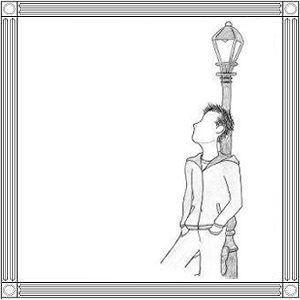 I didn’t answer – the music wouldn’t let me – but it was enough of a shock to pull my head around in his direction.
I didn’t answer – the music wouldn’t let me – but it was enough of a shock to pull my head around in his direction. Smith’s sudden evacuation of the vehicle was, in some senses, a positive development, but again I was left in an awkward position due to a lack of clear operational boundaries. Was I in a position to violate local traffic laws? Could I have justified the legal or financial risk of simply exiting the car in the middle of the street in a high-risk Capital City neighbourhood?
Smith’s sudden evacuation of the vehicle was, in some senses, a positive development, but again I was left in an awkward position due to a lack of clear operational boundaries. Was I in a position to violate local traffic laws? Could I have justified the legal or financial risk of simply exiting the car in the middle of the street in a high-risk Capital City neighbourhood? Turtledove, though – Atlas and I were escorted to a black Escalade late one afternoon and told to get inside. Our own Major Nelson Wily was already in the passenger seat, but the driver wasn’t military. Her hair was short, but the crisp cut of her black suit and white silk blouse was decidedly private sector. The easiest shorthand is that she looked like a mean Dame Judy Dench, and she was obviously making too much money to be a government employee.
Turtledove, though – Atlas and I were escorted to a black Escalade late one afternoon and told to get inside. Our own Major Nelson Wily was already in the passenger seat, but the driver wasn’t military. Her hair was short, but the crisp cut of her black suit and white silk blouse was decidedly private sector. The easiest shorthand is that she looked like a mean Dame Judy Dench, and she was obviously making too much money to be a government employee.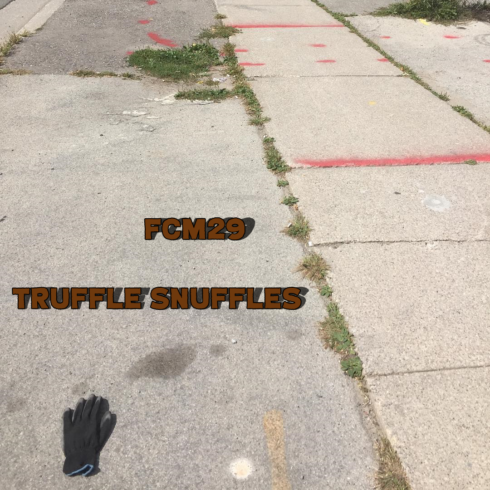
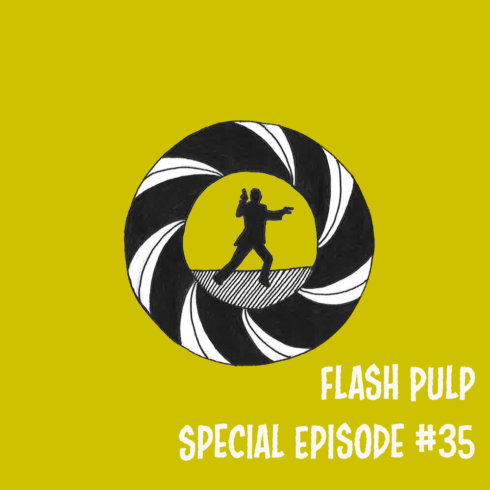
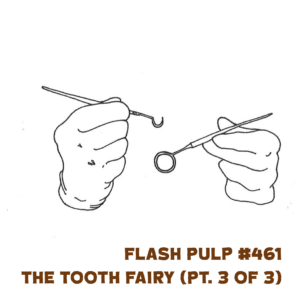 “I kind of get it though: How many hours do you spend in the chair with those folks? Maybe some of them you feel like you get to know. You see them in for their own suddenly missing teeth, or they’ve got a black eye, or a broken arm, and you ask what’s up.
“I kind of get it though: How many hours do you spend in the chair with those folks? Maybe some of them you feel like you get to know. You see them in for their own suddenly missing teeth, or they’ve got a black eye, or a broken arm, and you ask what’s up.
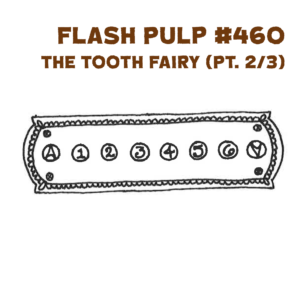 As the panel above the door counted off the floors of his ascent he worked hard not to raise a questioning brow at the camera. He was equally convinced that the woman in the front office was watching him carefully as he climbed, noting his departure on the twentieth – and topmost – floor, just in case she should be forced to give suddenly-summoned police officers directions on where the likely vagrant had gone.
As the panel above the door counted off the floors of his ascent he worked hard not to raise a questioning brow at the camera. He was equally convinced that the woman in the front office was watching him carefully as he climbed, noting his departure on the twentieth – and topmost – floor, just in case she should be forced to give suddenly-summoned police officers directions on where the likely vagrant had gone.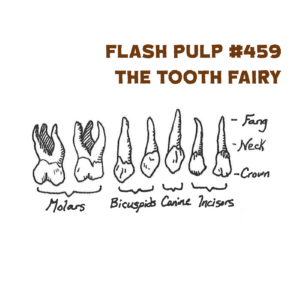 “Yeah, well, listen, Johnnie Walker was helping me unspool the story, and sometimes, you know, when I’ve had a few, I get some weird notions.”
“Yeah, well, listen, Johnnie Walker was helping me unspool the story, and sometimes, you know, when I’ve had a few, I get some weird notions.”